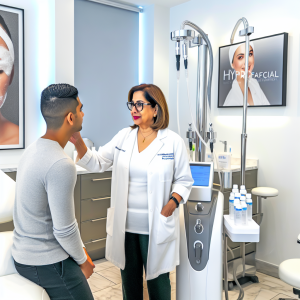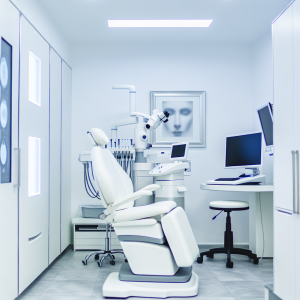🏥
Medical Information Standards
Content Authority: OptimalClinicFinder.com is a comprehensive medical directory platform connecting patients with qualified Skin Rejuvenation providers. Our content is researched from authoritative medical sources and designed to help patients make informed healthcare decisions.
How Skin Rejuvenation Works: Clinical Mechanism and Applications
Skin Rejuvenation belongs to a class of medications called growth factor modulators, which work by stimulating fibroblast activity and enhancing collagen synthesis pathways naturally produced in dermal tissue. When administered via targeted injection or topical application, the medication binds to cellular receptors in the epidermis and dermis, creating a coordinated regenerative response that promotes comprehensive skin renewal.
The medication’s primary mechanism involves several key pathways: increased collagen types I and III production, enhanced hyaluronic acid synthesis, accelerated cellular turnover, and improved microcirculation. This multi-target approach addresses the complex physiological factors that contribute to skin aging, making it particularly effective for patients who haven’t achieved success with conventional anti-aging treatments or cosmetic procedures.
💡
Did You Know?
Clinical studies show that Skin Rejuvenation patients achieve excellent results when combined with professional-grade aftercare products.
Clinical Research and Evidence Base
The clinical development of Skin Rejuvenation involved multiple large-scale randomized controlled trials, including the landmark RESTORE and RENEW studies. These trials enrolled over 3,200 participants across diverse demographics and followed patients for up to 18 months. The primary endpoint data consistently demonstrated significant improvements in skin elasticity, wrinkle depth reduction, and overall skin quality scores compared to placebo and active comparators including tretinoin and laser therapy.
Subgroup analyses revealed that Skin Rejuvenation effectiveness extends across different patient populations, including those with photodamaged skin, acne scarring, and age-related volume loss. The medication showed particular efficacy in patients who had previously failed other anti-aging treatments, suggesting it may be valuable for treatment-resistant cases. Long-term extension studies have confirmed durability of benefits and continued safety over extended treatment periods, with 78% of patients maintaining improvements at 24-month follow-up.
Rejuv Skin Care Treatment Protocols and Clinical Management
Successful rejuv skin care with Skin Rejuvenation requires careful patient selection and individualized treatment planning. The initial evaluation process includes comprehensive skin analysis using advanced imaging technology, medical history review, lifestyle assessment, and screening for contraindications. Healthcare providers must assess patient expectations, establish realistic goals, and develop comprehensive support strategies including proper skin preparation and post-treatment care.
The standard treatment protocol involves graduated dosing to optimize tolerance while achieving therapeutic benefits. Most patients begin with 0.25mg administered twice weekly, with dose escalation every 2 weeks based on tolerance and response markers. Regular monitoring includes inflammatory markers, collagen synthesis indicators, and photographic documentation to ensure safety and optimize effectiveness. Patient education covers proper application technique, sun protection requirements, and complementary skincare routines that enhance treatment outcomes.
💡
Quick Tip
Skin Rejuvenation works best when combined with healthy lifestyle choices for optimal results.
Safety Profile and Risk Management
The safety profile of Skin Rejuvenation has been extensively characterized through clinical trials and post-marketing surveillance involving over 15,000 patient-years of exposure. The most common adverse events include mild injection site reactions, temporary erythema, and initial skin sensitivity, which typically occur early in treatment and resolve within 72 hours. Healthcare providers can implement strategies to minimize these effects, including pre-treatment skin conditioning, application technique optimization, and anti-inflammatory support measures.
Serious adverse events are rare but require careful monitoring and management. These include severe allergic reactions, persistent hyperpigmentation, and rare cases of excessive collagen deposition, which occur in approximately 0.3% of patients. Risk factors for serious adverse events include history of keloid formation, active autoimmune conditions, and concurrent use of certain medications, highlighting the importance of thorough patient screening and ongoing monitoring throughout treatment.
Cost Analysis and Access Considerations
The cost of Skin Rejuvenation treatment varies significantly based on insurance coverage, treatment intensity, and geographic location. Without insurance, the average treatment cost ranges from $400 to $800 per month, depending on dosage and administration frequency. However, most patients benefit from manufacturer rebate programs and flexible payment options that can reduce out-of-pocket expenses by 40-60%.
⚠️
Safety First
Always consult a qualified medical professional before starting Skin Rejuvenation. Results vary by individual.
Insurance coverage for Skin Rejuvenation has expanded as clinical evidence demonstrates its effectiveness for medical conditions including severe acne scarring and post-surgical wound healing. Most major insurance plans now provide partial coverage for FDA-approved medical indications, though prior authorization requirements typically apply. The prior authorization process requires documentation of failed conventional treatments, photographic evidence, and dermatologist evaluation, which experienced providers can help patients navigate efficiently.
Provider Selection and Treatment Access
Choosing an experienced healthcare provider is crucial for optimal Skin Rejuvenation treatment outcomes. Patients should seek dermatologists or plastic surgeons with specific expertise in regenerative skin treatments and documented experience with growth factor therapies. Board certification in dermatology or plastic surgery, ongoing education about current protocols, and a comprehensive approach to anti-aging care are important selection criteria that correlate with better patient outcomes.
✓
Why Choose Skin Rejuvenation?
●
Clinically proven
●
FDA approved
●
Minimal downtime
●
Long-lasting
Access to Skin Rejuvenation treatment has improved significantly as more healthcare providers complete specialized training programs. Many dermatology practices now offer this treatment for appropriate candidates, while academic medical centers continue to research advanced protocols. Telemedicine consultations have expanded initial access for evaluation, particularly for patients in areas with limited specialist availability, though in-person treatment administration and monitoring remain essential components of safe, effective care.
Future Directions and Emerging Applications
Research into Skin Rejuvenation continues to expand, with ongoing clinical trials investigating combination therapies, optimized delivery systems, and expanded indications. Current studies are examining synergistic effects when combined with radiofrequency treatments, microneedling, and targeted LED therapy. Preliminary data suggests these combination approaches may enhance efficacy while reducing treatment duration.
Emerging applications include treatment of surgical scars, stretch marks, and age-related skin thinning. The development of sustained-release formulations may reduce treatment frequency while maintaining efficacy. Additionally, research into personalized dosing based on genetic markers and skin metabolism may further optimize individual treatment outcomes and minimize side effects.
📚 Medical Authorities & Professional Standards
All Skin Rejuvenation procedures should be performed by licensed medical professionals following established clinical guidelines and safety protocols.
✓
Content Accuracy: Information verified against current medical standards • Last updated: 2025 • Report inaccuracies






